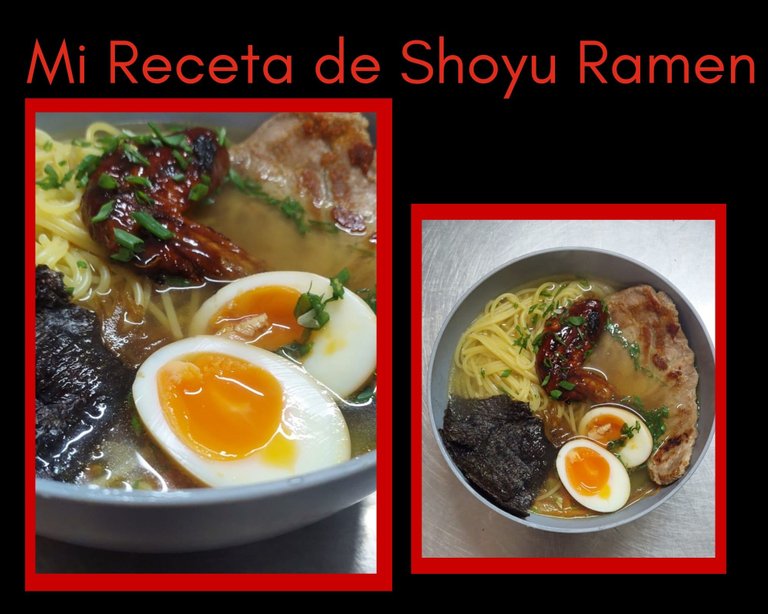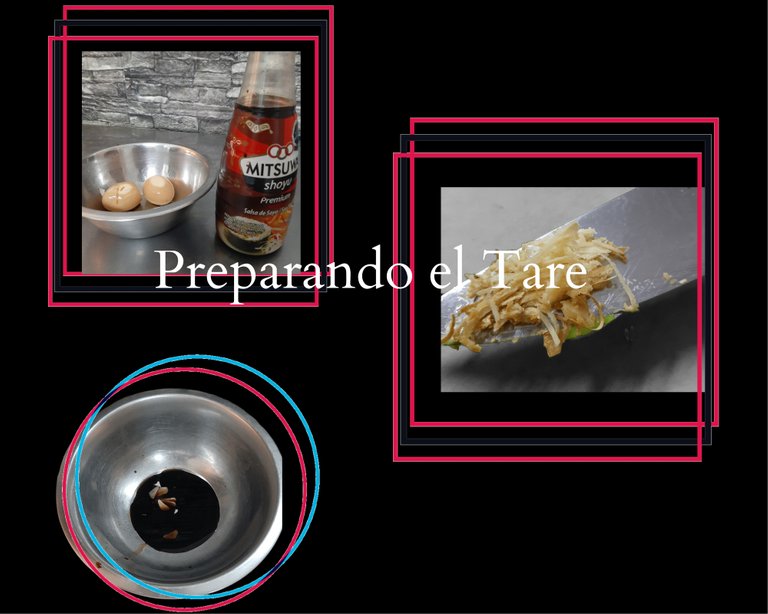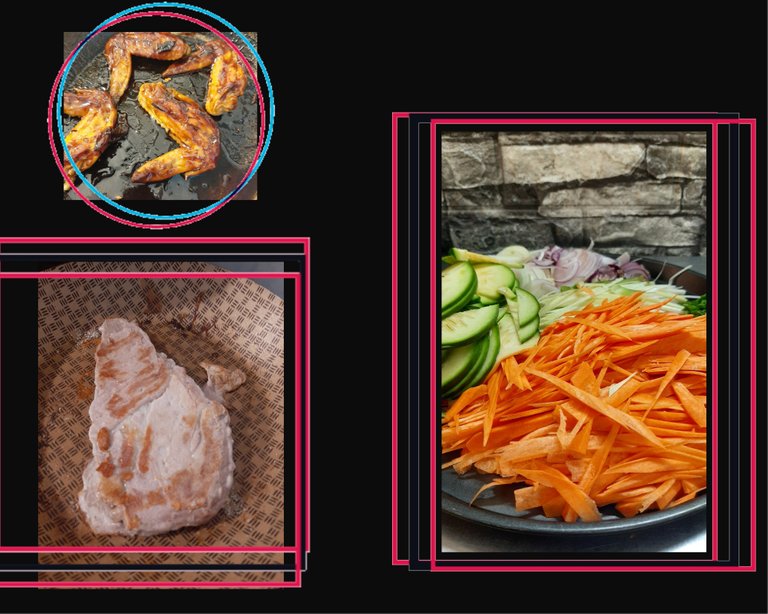Mi receta de Shoyu Ramen

El día de hoy les quiero ofrecer mi versión de esta popular sopa nipona.
Originalmente venía redactando un post sobre cómo hacer un bizcocho y todos los pasos para elaborar una torta en casa, pero ayer fue un día muy frío en Montevideo y para calentarnos decidimos hacer esta exquisita sopa con fideos de estilo asiático, comenzamos a cortar y a preparar los alimentos y al ver los hermosos colores en este plato supe que este sería mi siguiente post. Acompañenme por el recorrido de los pasos que hicimos en casa y anímense a hacer su propia versión de este plato tan delicioso.
Today I want to offer you my version of this popular Japanese soup.
Originally I was writing a post about how to make a cake and all the steps to make a cake at home, but yesterday was a very cold day in Montevideo and to warm up we decided to make this exquisite soup with Asian style noodles, we started to cut and prepare the food and when I saw the beautiful colors in this dish I knew this would be my next post. Join me for the tour of the steps we did at home and be encouraged to make your own version of this delicious dish.

Ingredientes para 4 porciones:
300 gr de pasta larga.
4 chuletas de cerdo sin ahumar
4 huevos al tare (más adelante explico cómo preparar el tare)
1.5 litro de caldo con vegetales
4 Alitas de pollo
1 alga nori.
Para el caldo:
4 Alitas de pollo
Media cebolla
La parte blanca del cebollín o cebolla de verdeo
2 hojas de puerro (la parte verde)
1 zapallito
1 zanahoria grande
2 dientes de ajo.
2 rodajas de gengibre grandes.
Para el tare:
100 ML de salsa de soja japonesa
1/4 de alga nori
2 dientes de ajo finamente cortado
2 rodajas de jengibre finamente cortado
1 rama de cebollín finamente cortado
Ingredients for 4 servings:
300 gr long pasta.
4 unsmoked pork chops
4 eggs al tare (I will explain later how to prepare the tare)
1.5 liter of broth with vegetables
4 chicken wings
1 nori seaweed.
For the broth:
4 chicken wings
Half an onion
The white part of scallion or green onion
2 leaves of leek (the green part)
1 small pumpkin
1 large carrot
2 cloves of garlic.
2 large slices of ginger.
For the tare:
100 ML Japanese soy sauce
1/4 nori seaweed
2 cloves of garlic, finely chopped
2 slices of ginger, finely chopped
1 sprig of spring onion finely chopped

Procedimiento:
He dividido la receta en partes para que se entienda mejor los distintos pasos que he realizado.
Elaboración del caldo de vegetales:
En una olla vierta 2 litros de agua con las alitas de pollo, la media cebolla, el tallo de cebollín y el ajo. Dejamos afuego alto hasta alcanzar el hervor, entonces bajamos el fuego y dejamos cocinar por lo menos media hora.
Pasado este tiempo retiramos las alitas y colamos. Debemos obtener un caldo claro y aromático.
Agregamos los vegetales finamente cortados. Y dejamos hervir otros 5 minutos. Reservamos
Elaboración del tare:
En un bowl agregamos la salsa de soja, el alga nori, el gengibre y el ajo. Dejamos reposar (podemos preparar más cantidad y guardar en la nevera hasta por 2 semanas, esto lo hacemos en casa).
Procedure:
I have divided the recipe into parts so that you can better understand the different steps I have performed.
Preparation of the vegetable broth:
In a pot pour 2 liters of water with the chicken wings, the half onion, the scallion stalk and the garlic. Let it boil until it reaches a boil, then lower the heat and let it cook for at least half an hour.
After this time, remove the wings and strain. We must obtain a clear and aromatic broth.
Add the finely chopped vegetables. Let it boil for another 5 minutes. Reserve
Preparation of the tare:
In a bowl add the soy sauce, nori seaweed, ginger and garlic. Let stand (we can prepare more and store in the refrigerator for up to 2 weeks, we do this at home).
Proceso de cocción de los huevos:
Para obtener un huevo de yema blanda y que la misma quedé en el centro, pondremos agua suficiente para cubrirlos en una olla a hervir, cuando esté punto sea alcanzado vamos a introducir los huevos y removemos constantemente por un minuto, luego dejamos cocer por exactamente 6 minutos. Transcurrido ese tiempo pasamos los huevos a un bowl con agua y hielos para detener el proceso de cocción.
Una vez retirada la cáscara de los mismos, dejamos remojar en el tare.
Egg cooking process:
To obtain a soft yolk egg and that the yolk remains in the center, we will put enough water to cover them in a pot to boil, when this point is reached we are going to introduce the eggs and stir constantly for a minute, then we let them cook for exactly 6 minutes. After this time we transfer the eggs to a bowl with water and ice to stop the cooking process.
Once the shells are removed, let them soak in the tare.
Cocinando las chuletas:
En un sartén con un poco de aceite sofreímos las chuletas aderezadas con sal y pimienta al gusto hasta obtener un lindo color dorado (5 minutos por cada lado)
Sofreímos las alitas de pollo antes reservadas aderezadas con sal, pimienta y salsa de soja hasta obtener un color dorado.
Cocinamos la pasta al dente.
Cooking the chops:
In a frying pan with a little oil we fry the chops seasoned with salt and pepper to taste until a nice golden color (5 minutes per side).
Fry the reserved chicken wings seasoned with salt, pepper and soy sauce until golden brown.
Cook the pasta al dente.
Proceso de emplatado:
En un plato hondo servimos el caldo con los vegetales (en este orden para obtener un lindo y llamativo plato), la pasta, las chuletas, las alitas, cortamos a la mitad los huevos, con ayuda de una cuchara agregamos el tare al caldo y para finalizar decoramos con el cebollín finamente cortado. ¡Y listo! Podemos disfrutar de nuestro exquisito ramen hecho en casa.
Plating process:
In a deep dish we serve the broth with the vegetables (in this order to obtain a nice and attractive dish), the pasta, the chops, the wings, cut the eggs in half, with the help of a spoon we add the tare to the broth and finally we decorate with the finely chopped chives. And that's it! We can enjoy our delicious homemade ramen

Consejo: ser cuidadoso con las cantidades de sal utilizadas. En lo personal me gusta que cada persona agregue la cantidad deseada al finalizar.
Espero les haya gustado mi versión del ramen y se animen a prepararlo. En casa solemos disfrutar mucho este plato, es tanto así, que hemos llegado a elaborar nuestros propios fideos, pero eso se los contaré en otro post.
Si has elaborado sopa ramen, cuéntame tu receta y si te animas a elaborar mi receta, cuéntame tu experiencia.
Tip: be careful with the amount of salt used. Personally I like each person to add the desired amount at the end.
I hope you liked my version of ramen and I encourage you to prepare it. At home we usually enjoy this dish very much, so much so, that we have even made our own noodles, but I will tell you about that in another post.
If you have made ramen soup, tell me your recipe and if you are encouraged to make my recipe, tell me your experience.

Todas las imágenes son de mi propiedad y fueron editadas en canvas


se ve interesante esta receta amiga, pero que va, no es lo mio jiji , pero te felicito, por crear algo distinto, saludos
Si la pruebas te enamoras. Te lo aseguro.
Amiga @mekare que interesante conocer otras culturas y sus deliciosos platillos, tu receta está fabulosa, todo luce muy delicioso. Estas comenzando con buen pie, haces un trabajo excelente, se nota que te apasiona lo que haces. Ten por seguro que nos verás mucho por aquí compartiendo tu trabajo. Saludos y éxitos en la plataforma!😊
Muchísimas gracias amiga. Vamos a crecer juntas.
¡Felicidades! Esta publicación obtuvo upvote y fue compartido por @la-colmena, un proyecto de Curación Manual para la comunidad hispana de Hive que cuenta con el respaldo de @curie.
Si te gusta el trabajo que hacemos, te invitamos a darle tu voto a este comentario y a votar como testigo por Curie.
Si quieres saber más sobre nuestro proyecto, acompáñanos en Discord: La Colmena.
Me siento muy honrada de haber recibido su atención. Gracias.
Your content has been voted as a part of Encouragement program. Keep up the good work!
Use Ecency daily to boost your growth on platform!
Support Ecency
Vote for new Proposal
Delegate HP and earn more
Muchísimas gracias.
Muy interesante, se ve deliciosa esta receta.
Un placer conseguirte hermano. Un gran abrazo.
Dioses, me ganaste con este platillo. Soy fan del ramen a morir aunque no sé prepararlo. Exquisito. Gracias por compartir. Bienvenida y saludos ❤️
Estoy muy feliz de saber que te ha gustado. Ojalá la pongas en práctica y la disfrutes mucho.
Congratulations @mekare! You have completed the following achievement on the Hive blockchain and have been rewarded with new badge(s):
Your next target is to reach 600 upvotes.
Your next target is to reach 50 replies.
You can view your badges on your board and compare yourself to others in the Ranking
If you no longer want to receive notifications, reply to this comment with the word
STOPCheck out the last post from @hivebuzz:
Support the HiveBuzz project. Vote for our proposal!
Se ve demasiado rica abra que probarla acá es difícil conseguir los implementó para realizar un plato típico nipón
Creeme, son cosas sencillas que sumadas te dan ese resultado.